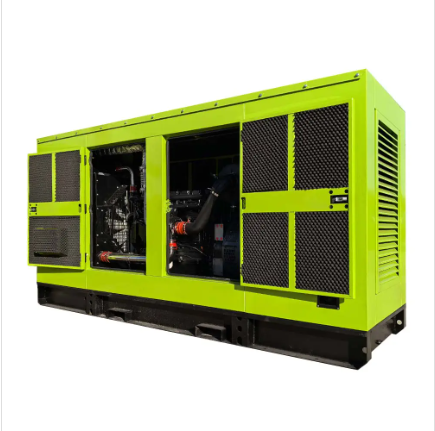ما هو مولد الديزل ?
التعريف الأساسي والغرض
تستخدم المولدات التي تعمل بالديزل وقود الديزل العادي وتحوله إلى طاقة ميكانيكية من خلال الاحتراق، ومن ثم تُحوَّل هذه الطاقة إلى كهرباء قابلة للاستخدام. تُعد هذه المولدات مهمة للغاية في العديد من المواقف. عندما يتعطل أو يواجه الشبكة الكهربائية الرئيسية مشاكل، تضمن هذه المعدات استمرار العمل دون انقطاع. ولذلك تجدها موجودة في كل مكان، من القرى النائية إلى مواقع البناء الكبيرة. على سبيل المثال، في ماليزيا، يعتمد الناس بشكل كبير على المولدات التي تعمل بالديزل بسبب تكرار انقطاع التيار الكهربائي هناك. تعتمد شركات البناء ومصانع وحتى المدن الصغيرة على هذه المولدات لضمان استمرار عملياتها خلال فترات انقطاع التيار غير المتوقعة. وليست مهمتها فقط إبقاء الأنوار مضاءة، بل تساعد هذه المولدات أيضًا في دفع مشاريع التنمية قدمًا ودعم المجتمعات الناشئة في مختلف أنحاء البلاد.
نظرة عامة على المكونات الرئيسية
لفهم آلية عمل مولدات الديزل، من المفيد معرفة ما يُحفّزها على العمل. تتكون معظم مولدات الديزل من أربعة أجزاء رئيسية: المحرك، والمولد الكهربائي، ونظام الوقود، ولوحة التحكم. يجب أن تعمل جميع هذه الأجزاء معًا حتى يتمكن المولد من توليد الطاقة عند الحاجة. يعمل المحرك كمكون أساسي، حيث يحرق وقود الديزل لتوليد قوة ميكانيكية. ماذا يحدث بعد ذلك؟ تتحول هذه الطاقة الميكانيكية إلى تيار كهربائي من خلال دوار المولد الكهربائي والمجالات المغناطيسية. وفي الوقت نفسه، تحافظ لوحة التحكم على سير كل شيء بسلاسة خلف الكواليس، حيث تراقب درجات الحرارة وتضبط المخرجات حسب الضرورة. ودعونا لا ننسى نظام الوقود، الذي يجب أن يغذي باستمرار ديزلًا جديدًا للحفاظ على استمرارية العمل أثناء الانقطاعات الطويلة أو حالات الطوارئ. عندما تتعاون جميع هذه الأجزاء بشكل صحيح، تصبح مولدات الديزل مصادر طاقة احتياطية موثوقة لمواقع البناء والمستشفيات وغيرها من المواقع الحرجة حيث لا يمكن انقطاع الكهرباء.
المكونات الرئيسية مولد الديزل
محرك الديزل: مصدر القوة
في قلب كل مولد ديزل يكمن محرك الديزل نفسه، الذي يقوم بتحويل وقود الديزل إلى طاقة ميكانيكية يمكن استخدامها. تسير العملية الأساسية على النحو التالي: أولاً يتم سحب الهواء، ثم يتم ضغطه بقوة داخل الأسطوانة، وأخيرًا يشتعل عندما يتم رش الوقود في اللحظة المناسبة تمامًا لإحداث تلك الانفحة القوية للطاقة. يختار معظم الناس محركات الديزل للمولدات لأنها ببساطة توفر أداءً أفضل في استهلاك الوقود مقارنة بالبدائل الغازية، كما أنها تدوم عادةً لفترة أطول بكثير بين الأعطال. تعمل هذه المحركات أيضًا بشكل مختلف، حيث تعتمد على نسب ضغط تفوق بشكل كبير ما نراه في النماذج البنزينية. ضغط أعلى يعني كفاءة أعظمية بشكل عام، كما يسهم أيضًا في جودة تصنيع أقوى وعمر افتراضي أطول تحت مختلف ظروف التشغيل.
المولد: تحويل الطاقة الميكانيكية إلى طاقة كهربائية
يقوم المولد بعمل مهم للغاية بالنسبة للمولدات، حيث يستمد القوة الميكانيكية من محرك ديزل ويعمل على تحويلها إلى كهرباء من خلال ما يُعرف باسم الحث الكهرومغناطيسي. ببساطة، عندما يدور الروتور الموجود داخل المولد داخل الثابت، فإنه يولد تيارًا مترددًا في تلك اللفائف النحاسية التي نراها هناك. كما توجد أيضًا أنواع مختلفة من المولدات، بشكل رئيسي النماذج المتزامنة وغير المتزامنة، وهذه بالفعل تُحدث فرقًا في كفاءة تشغيلها ونوعية الإخراج الكهربائي الذي تنتجه. إن الاختيار بين هذه الخيارات يُعد أمرًا مهمًا إلى حد كبير بالنسبة لأداء المولد الكلي، خاصة عند أخذ عوامل مثل موقع الاستخدام وأنواع الأحمال التي تحتاج إلى طاقة في أي وقت معين.
نظام الوقود وآليات التبريد
لكي يعمل المولد الكهربائي الديزل بأفضل أداء، فإن وجود نظام وقود جيد يلعب دوراً كبيراً. يتضمن النظام أجزاء مثل خزانات الوقود والفلاتر والحقنات التي يجب أن تعمل جميعها بشكل صحيح مع بعضها البعض. عندما تعمل هذه الأجزاء بشكل جيد، فإنها توفر تدفقاً مستمراً للوقود دون تلوث، مما يحافظ على تشغيل المولد بسلاسة يوماً بعد يوم. كما تلعب أنظمة التبريد دوراً كبيراً في الحفاظ على كفاءة المولدات على المدى الطويل. تعتمد معظم الأنظمة على سوائل التبريد التي تتحرك داخل المبردات (الرادياتيرات) للتخلص من الحرارة الزائدة. بدون تبريد مناسب، يمكن أن يسخن المولد بسرعة، خاصة عندما يعمل دون توقف لفترات طويلة. يساعد التبريد الجيد في الحفاظ على درجات حرارة تشغيل آمنة، مما يجعل المعدات تدوم لفترة أطول بين فترات الصيانة.
عملية توليد الكهرباء خطوة بخطوة
الاحتراق الداخلي والضغط
تبدأ عملية إنتاج الكهرباء في المولدات التي تعمل بالديزل بما يُعرف بعملية الاحتراق الداخلي. عند تشغيل المولد، يتم رش وقود الديزل داخل غرفة الاحتراق حيث يختلط بالهواء. ماذا يحدث بعد ذلك؟ يتم ضغط الخليط تحت ضغط شديد حتى يشتعل الوقود تلقائيًا. بمجرد اشتعاله، تدفع الغازات الساخنة ضد أجزاء المحرك، مُولدةً تلك الدفعات الميكانيكية التي نعرفها جميعًا من فصول ميكانيكا السيارات الأساسية. وفي صميم العملية تكمن الفكرة البسيطة ولكن القوية، وهي تحويل الطاقة الكيميائية المخزنة في الديزل إلى طاقة حركية تُحرك الأجزاء الميكانيكية. هذه هي بالأساس الطريقة التي تعمل بها معظم أنظمة الطاقة الاحتياطية عندما تفشل الشبكات الكهربائية أثناء العواصف أو الانقطاعات الكهربائية.
الاستقراء الكهرومغناطيسي في المولد الكهربائي
عندما يُنتج المحرك طاقة ميكانيكية، فإن ما يحدث بعد ذلك مثيرٌ للاهتمام إلى حدٍ كبير — حيث يتم تحويل هذه الطاقة إلى طاقة كهربائية بفضل شيء يُسمى الحث الكهرومغناطيسي. لقد اكتشف مايكل فاراداي هذا الأمر في الماضي، ويُطبَّق اكتشافه هذا داخل جزء المُعَدِّل (البديلور) في معظم المولدات في الوقت الحالي. وبشكل أساسي، عندما تُجبر القوة الميكانيكية الدوار على الدوران داخل مجال المغناطيس في المُعَدِّل، عندها فقط تُنتَج الكهرباء. وتحقيق تصميمات جيدة للمُعَدِّل تضمن سير هذه العملية برمتها بسلاسة، بحيث يمكن للمولدات أن تُخرِج ما يكفي من الطاقة الكهربائية لتشغيل كل أنواع الأدوات والآلات. ولدى الأشخاص الذين يعملون بانتظام مع المولدات التي تعمل بالديزل، فإن إتقان هذا التحويل من ميكانيكي إلى كهربائي يُحدث فرقاً كبيراً في الأداء العام لكل المعدات.
تنظيم الجهد والإخراج
يُعد التحكم الصحيح في الجهد الكهربائي أمراً بالغ الأهمية عند تشغيل المولدات diesel، نظراً لحاجتها إلى إنتاج الكهرباء بمستويات جهد مستقرة باستمرار. وفي حال عدم توفر هذا النوع من الاستقرار، قد تتعرض المعدات الكهربائية المتصلة بهذه المولدات للتلف أو العمل بشكل غير فعال. في الواقع، تحتوي معظم الموديلات الحديثة على مُنظمات جهد تلقائية مدمجة، وتُعرف اختصاراً باسم AVRs. تُعد هذه المكونات الصغيرة مفيدة للغاية في تعزيز استقرار الكهرباء وموثوقيتها المنبعثة من المولد. تُحدث التكنولوجيا المستخدمة في هذا التنظيم فرقاً كبيراً لأي شخص يحتاج إلى إمدادات طاقة متسقة. ولهذا السبب لا تزال المولدات diesel تُستخدم على نطاق واسع في مواقع البناء وأنظمة الطوارئ في المستشفيات حيث لا يمكن التسامح مع انقطاع التيار الكهربائي.
التطبيقات الشائعة وحالات الاستخدام
الطاقة الاحتياطية للمنازل والشركات
عندما ينقطع التيار الكهربائي، تُصبح مولدات الديزل منقذةً للمنازل والشركات على حدٍ سواء. تُبقي هذه الآلات الأضواء والمعدات تعمل دون انقطاع، فلا تتوقف الأعمال المهمة لمجرد تعطل شبكة الكهرباء الرئيسية. سكان المناطق الريفية أو الساحلية المُعرّضة للأعاصير يدركون هذا جيدًا. لنأخذ فلوريدا على سبيل المثال، حيث تُقطع الكهرباء بانتظام بسبب العواصف. الأداء المُستقر لهذه المولدات يعني أنها غالبًا ما تكون الحل الأمثل لأي شخص جاد في الاستعداد لحالات الطوارئ، سواءً كانت صغيرة. الرئيسية أو مصنعًا كبيرًا يحتاج إلى تشغيل مستمر.
العمليات الصناعية ومواقع النائية
بالنسبة للكثير من العمليات الصناعية والمواقع النائية، تظل المولدات الكهربائية التي تعمل بالديزل ضرورة ملحة عندما يتعلق الأمر بإبقاء الأنوار مضاءة. تعتمد مصانع التصنيع بشكل كبير على هذه الآلات، خاصة في الأماكن التي لا يتوفر فيها التيار الكهربائي العادي. خذ على سبيل المثال مواقع البناء، أو عمليات التعدين الكبيرة في قلب المناطق البرية، ناهيك عن منصات النفط البحرية. تحتاج هذه الأماكن إلى حلول جادة لدعم الطاقة الاحتياطية، وبصراحة، لا شيء يتفوق على المولدات الكهربائية التي تعمل بالديزل في إنجاز المهمة بالشكل الصحيح. مُصنعة بمتانة وصممت لتتحمل الظروف القاسية، تستمر في العمل حتى عندما تفشل باقي الحلول، مما يفسر سبب اعتماد العديد من الشركات عليها رغم كل الحديث عن البدائل الأكثر صداقة للبيئة.
الخدمات الطارئة وإغاثة الكوارث
تُعد المولدات الكهربائية التي تعمل بالديزل مهمة للغاية عندما تحدث حالات طوارئ أو كوارث. خلال هذه الظروف الصعبة، تُحافظ هذه الماكينات على استمرار تدفق الكهرباء في أماكن مثل المستشفيات والملاجئ المؤقتة وللفرق الإنقاذية التي تحتاج إلى الإضاءة والأدوات لتأدية مهامها بشكل صحيح. بدون هذه الطاقة الاحتياطية، لكانت توقفت العديد من العمليات المنقذة للحياة. ما يُميز المولدات الكهربائية الديزلية هو قدرتها على النقل بسهولة والاعتماد عليها حتى في الظروف القاسية. ولهذا السبب نراها منتشرة في كل مكان بعد حدوث عواصف أو زلازل، حيث تساعد في إصلاح المباني المتضررة وتدعم المجتمعات المحلية بينما تحاول الوقوف على أقدامها مجددًا بعد مرور أسوأ الظروف.
لماذا مولد الديزل المولدات كفؤة وموثوقة
كفاءة الوقود مقارنة بمولدات الغاز
عندما يتعلق الأمر بتكاليف التشغيل، فإن المولدات التي تعمل بالديزل تتفوق عادةً على المولدات التي تعمل بالغاز من حيث الكفاءة في استهلاك الوقود، مما يؤدي إلى توفير المال على المدى الطويل. ما الذي يمنح الديزل هذا التفوق؟ حسنًا، الوقود الديزلي يحتوي على طاقة أكثر لكل لتر مقارنةً بالبنزين. إذن بشكل أساسي، نحصل على أداءً أكثر مقابل كل لتر نستخدمه من الديزل. بالنسبة للأشخاص الذين يحتاجون إلى الطاقة لفترات طويلة أو يرغبون في الحصول على مصدر احتياطي موثوق به أثناء الانقطاعات، فإن وحدات الديزل منطقية لأنها تستهلك كمية وقود أقل بينما تنتج نفس كمية الطاقة الكهربائية مثل نظيراتها التي تعمل بالغاز. هذا هو السبب في أن العديد من الشركات الصغيرة ما زالت تعتمد على المولدات الديزل التقليدية رغم توفر خيارات تقنية أكثر حداثة في الوقت الحالي.
الصمود والعمل على المدى الطويل
تُصنع المولدات ديزل لتكون متينة لفترة طويلة بفضل تركيبتها القوية، والتي تساعد في تحمل الظروف الصعبة يومًا بعد يوم. يمكن لهذه الماكينات تحمل الكثير من الاستخدام قبل أن تظهر عليها علامات التآكل، لذا فهي تعمل بشكل موثوق به في مختلف الأماكن، من المواقع الصناعية إلى المناطق النائية. وللحفاظ على تشغيلها بسلاسة، يجب إجراء فحوصات دورية على الأجزاء واستبدال أي قطع تالفة قبل أن تتعطل تمامًا. يجد معظم الناس أن الصيانة الجيدة تضيف سنوات عديدة إلى عمر المولد. بالنسبة للشركات التي تحتاج إلى طاقة احتياطية أو أصحاب المنازل الذين يرغبون في الأمان أثناء انقطاع التيار الكهربائي، تمثل المولدات ديزل قيمة جيدة على المدى الطويل. فهي توفر أداءً ثابتًا دون الحاجة إلى تعديلات مستمرة، مما يجعلها واحدة من أكثر الخيارات موثوقية عندما ينقطع التيار الكهربائي.
نصائح الصيانة للحفاظ على طول العمر
تغيير الزيت والفلتر بشكل دوري
إن الالتزام بتغييرات دورية للزيت والفلاتر يطيل بشكل كبير من عمر المولدات الكهربائية الديزل. عندما نقوم باستبدال هذه الأجزاء وفقاً للتوصيات المصنعة، فإن ذلك يحافظ على تشغيل المحرك بشكل أفضل، ويقلل من التآكل، ويجعل كل المكونات تعمل بكفاءة أكبر. كما أن الالتزام بجداول الصيانة يمنع حدوث مشاكل كبيرة في المستقبل، مما يضمن استمرار عمل المولدات الديزل بكفاءة لسنوات طويلة بدلاً من حدوث أعطال مفاجئة.
مراقبة نظام السائل المنخفض والأنظمة العادمة
إن مراقبة مستويات سائل التبريد وفحص نظام العادم بانتظام يمكن أن يمنع مشاكل ارتفاع درجة الحرارة قبل حدوثها ويُسهم في الحفاظ على الأداء الجيد على المدى الطويل. عندما يعمل نظام التبريد بشكل صحيح، يبقى المولد ضمن نطاق درجة الحرارة الآمنة المسموحة. يقوم نظام العادم بدور مزدوج يتمثل في إدارة الانبعاثات بحيث تظل ضمن الحدود التي تفرضها اللوائح. لكن هذه الفحوصات الصيانية ليست مجرد مهام روتينية، إذ إن لها تأثيرًا كبيرًا في تمديد عمر المولد الديزل دون حدوث أعطال كبيرة. وغالبًا ما ينصح الفنيون الذين يسألهم أحد بأن الصيانة المناسبة توفر المال على المدى الطويل لأنها تمنع الحاجة إلى إصلاحات مكلفة في المستقبل.
فحص البطارية والمكونات الكهربائية
إن الفحص المنتظم للبطاريات والأجزاء الكهربائية يُحدث فرقاً كبيراً عندما يتعلق الأمر بمنع الانقطاعات المفاجئة للطاقة والحصول على أداء أفضل من المولدات. عندما تظل هذه المكونات في حالة جيدة، يعمل كل شيء بسلاسة دون انقطاع. وجدت الدراسات شيئاً مثيراً للصدمة بالفعل - إذا تجاهل الأشخاص هذا الصيانة الأساسية، فإن احتمال تعرضهم لمشاكل في المولدات يزيد بنسبة تصل إلى 80%. وذلك هو السبب في أن الاعتناء بالأنظمة الكهربائية لا ينبغي أن يكون أمراً ثانوياً بل جزءاً من العمليات الروتينية. إن قضاء وقت قليل فقط على فحص الوصلات واختبار المعدات بشكل دوري يُحقق عوائد كبيرة على المدى الطويل مع طاقة موثوقة متى ما احتجت إليها.
الأسئلة الشائعة
ما هي المكونات الرئيسية لمولد الديزل؟
يتكون مولد الديزل من محرك ديزل، ومولد كهربائي، ونظام وقود، ولوحة تحكم. تعمل هذه المكونات معًا لضمان تقديم المولد للطاقة بشكل موثوق وكفؤ.
لماذا تعتبر مولدات الديزل فعالة؟
تعتبر مولدات الديزل فعالة بسبب كثافتها الطاقية الأعلى، مما يسمح لها بإنتاج طاقة أكبر لكل لتر من الوقود مقارنة بمولدات الغاز. وهذا يؤدي إلى استهلاك أقل للوقود ووفر تكاليف مع مرور الوقت.
كم مرة يجب تغيير الزيت والفلاتر في مولد ديزل؟
يجب تغيير الزيت والفلاتر وفقًا لتوصيات الشركة المصنعة. يضمن الصيانة الدورية عمل المحرك بسلاسة ويعزز كفاءة المولد وطول عمره.

